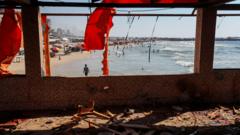With a significant portion of the Ukrainian populace distrusting the Russian ceasefire announcement, President Zelensky firmly rejects the proposal, arguing it serves as a façade for Russia's military strategy while exposing the emotional toll the war has taken on families.
Ukrainians Skeptical of Russia's Advertised Ceasefire Amid Ongoing Conflict

Ukrainians Skeptical of Russia's Advertised Ceasefire Amid Ongoing Conflict
As Russia announces a three-day pause in hostilities to celebrate Victory Day, skepticism and mistrust prevail in Ukraine regarding the true intentions behind this proposal.
In a surprising move, Russia announced a self-declared three-day ceasefire starting Wednesday night, coinciding with the 80th anniversary of the end of World War Two. However, many Ukrainians, including President Volodymyr Zelensky, view this gesture more as a "theatrical show" than a genuine effort towards peace. The Russian proposal came alongside an invitation for a substantial 30-day ceasefire and negotiations, which Ukraine had accepted, but Moscow declined.
Zelensky's rejection of the ceasefire, particularly with the precarious backdrop of ongoing bombardments, sparked a wave of skepticism across Ukraine. One local resident, Tetyana Kondratenko, expressed disbelief, citing intensified shelling instead of the promised respite. The sentiment was echoed by other citizens, as polls indicate that about 95% of Ukrainians harbor distrust towards Russia's intentions.
Recently, an unsettling pattern has emerged where previous ceasefire announcements have been exploited by Russian forces to regroup and launch new attacks, casting doubt on their credibility. Following a similar ceasefire proposal last month, Ukraine accused Russia of violating the truce thousands of times, prompting officials to maintain a cautious stance on this new offer.
Despite the prevailing skepticism, the emotional toll of conflict remains palpable. Residents like Antonina Sienina, who lost family members to Russian strikes, expressed a yearning for any form of respite, even if temporary. Others, such as Oleksii Kamchatnyi, stressed the importance of saving lives, indicating a willingness to consider any ceasefire, provided it prioritizes Ukraine’s safety.
As military operations continue, reports of missile strikes in Kyiv underscore the overarching uncertainty of the conflict. With the Russian government downplaying drone attacks and carrying on with its plans for Victory Day, many Ukrainians remain unconvinced that this ceasefire is anything but a calculated effort by the Kremlin to reassert control over the narrative.
Former Ukrainian officials have framed the ceasefire announcement as a propaganda tactic, emphasizing that genuine peace negotiations must be rooted in mutual recognition and security. Military analyst Mykhailo Samus stated, "Why would we play Putin's game?" – highlighting the desire for a legitimate cessation of hostilities rather than John theatrical gestures.
As the situation unfolds, it is clear that the road to peace remains fraught with complexities, mistrust, and the persistent hope of a lasting resolution to conflict.
Zelensky's rejection of the ceasefire, particularly with the precarious backdrop of ongoing bombardments, sparked a wave of skepticism across Ukraine. One local resident, Tetyana Kondratenko, expressed disbelief, citing intensified shelling instead of the promised respite. The sentiment was echoed by other citizens, as polls indicate that about 95% of Ukrainians harbor distrust towards Russia's intentions.
Recently, an unsettling pattern has emerged where previous ceasefire announcements have been exploited by Russian forces to regroup and launch new attacks, casting doubt on their credibility. Following a similar ceasefire proposal last month, Ukraine accused Russia of violating the truce thousands of times, prompting officials to maintain a cautious stance on this new offer.
Despite the prevailing skepticism, the emotional toll of conflict remains palpable. Residents like Antonina Sienina, who lost family members to Russian strikes, expressed a yearning for any form of respite, even if temporary. Others, such as Oleksii Kamchatnyi, stressed the importance of saving lives, indicating a willingness to consider any ceasefire, provided it prioritizes Ukraine’s safety.
As military operations continue, reports of missile strikes in Kyiv underscore the overarching uncertainty of the conflict. With the Russian government downplaying drone attacks and carrying on with its plans for Victory Day, many Ukrainians remain unconvinced that this ceasefire is anything but a calculated effort by the Kremlin to reassert control over the narrative.
Former Ukrainian officials have framed the ceasefire announcement as a propaganda tactic, emphasizing that genuine peace negotiations must be rooted in mutual recognition and security. Military analyst Mykhailo Samus stated, "Why would we play Putin's game?" – highlighting the desire for a legitimate cessation of hostilities rather than John theatrical gestures.
As the situation unfolds, it is clear that the road to peace remains fraught with complexities, mistrust, and the persistent hope of a lasting resolution to conflict.



















